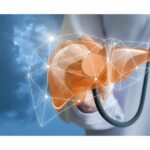If you want to protect your liver from damage, there are several simple steps you can take.
Limit your alcohol intake, maintain a healthy diet, stay hydrated, exercise regularly, and get regular check-ups.
By following these guidelines, you can promote liver health and reduce the risk of liver damage.
Take control of your health and safeguard your liver with these evidence-based preventive measures.
Limit Alcohol Consumption
To prevent liver damage, you should limit your alcohol intake. Excessive alcohol consumption can lead to serious liver conditions such as fatty liver disease, alcoholic hepatitis, and cirrhosis. It's essential to follow alcohol consumption restrictions to maintain a healthy liver.
The Centers for Disease Control and Prevention (CDC) recommends that men should limit their alcohol intake to no more than two standard drinks per day, while women should limit it to one standard drink per day.
If you find it challenging to reduce your alcohol consumption, there are alternative beverages you can try. Non-alcoholic beer and wine are becoming increasingly popular and can provide a similar taste experience without the negative effects of alcohol on your liver. These beverages are widely available and come in various flavors to suit different preferences.
Additionally, there are numerous alcohol-free cocktails and mocktail recipes that you can explore to enjoy a refreshing drink without the harmful effects of excessive alcohol intake.
Maintain a Healthy Diet
To maintain a healthy liver and prevent damage, it's important for you to focus on maintaining a healthy diet. A balanced nutrition plays a crucial role in supporting liver health and preventing liver damage. Here are some key points to keep in mind:
- Incorporate a variety of fruits and vegetables in your diet: Fruits and vegetables are packed with essential vitamins, minerals, and antioxidants that are beneficial for liver health. They help to reduce inflammation and promote detoxification.
- Avoid fatty foods: Consuming excessive amounts of fatty foods can lead to the accumulation of fat in the liver, which can eventually cause liver damage. Opt for lean protein sources like fish, poultry, and legumes, and choose healthy fats from sources like avocado, nuts, and olive oil.
- Limit processed foods and sugary drinks: Processed foods and sugary drinks often contain high levels of unhealthy fats, added sugars, and artificial additives. These can burden the liver and contribute to liver damage. Instead, opt for whole, unprocessed foods and choose water or herbal tea as your go-to beverages.
Stay Hydrated
Make sure you regularly drink enough water to stay hydrated and support your liver health. Adequate water intake is essential for maintaining optimal liver function and preventing liver damage. Water plays a crucial role in various liver processes, including detoxification, nutrient transportation, and waste elimination.
Proper hydration is important for liver health because it helps to flush out toxins and waste products from the body. When you're dehydrated, your liver may not be able to function optimally, leading to a buildup of toxins and an increased risk of liver damage. Additionally, staying hydrated helps to promote the production of bile, which is necessary for the digestion and absorption of fats and fat-soluble vitamins.
To ensure you're drinking enough water, aim for at least 8 glasses (64 ounces) per day. However, individual water needs may vary depending on factors such as age, weight, activity level, and climate. It's important to listen to your body and drink when you feel thirsty.
In addition to water, you can also consume hydrating foods such as fruits and vegetables, which have high water content. However, it's important to note that water is still the best and most effective way to stay hydrated.
Exercise Regularly
Stay active and incorporate regular exercise into your routine to prevent liver damage. Physical activity offers numerous benefits for your overall health, including liver health. Here are some key points to consider:
- Aerobic exercises: Engaging in activities like brisk walking, jogging, swimming, or cycling can help improve blood circulation, which in turn enhances liver function. Aim for at least 150 minutes of moderate-intensity aerobic exercise per week.
- Strength training: Including resistance exercises, such as weightlifting or bodyweight exercises, can help build muscle mass and reduce fat accumulation in the liver. This can lower the risk of developing fatty liver disease. Aim for two or more strength training sessions per week.
Regular exercise not only reduces the risk of liver damage but also improves insulin sensitivity, reduces inflammation, and promotes weight loss, all of which contribute to better liver health. It's essential to choose activities that you enjoy and can sustain in the long term.
Remember to consult with your healthcare provider before starting any new exercise program, especially if you have underlying health conditions.
Stay active and prioritize your liver health through regular exercise.
Get Regular Check-Ups
During your journey to prevent liver damage, it's important to prioritize your health by getting regular check-ups. Early detection is key when it comes to liver diseases, as they often progress silently without causing noticeable symptoms until the later stages. By undergoing regular medical screenings, you can catch any potential liver damage early on, allowing for prompt intervention and treatment.
Regular check-ups with your healthcare provider provide an opportunity to assess the health of your liver. These check-ups typically involve a series of tests and examinations, such as blood tests to measure liver enzymes and assess liver function. Additional imaging tests, such as ultrasound or MRI, may be recommended to evaluate the structure of the liver and detect any abnormalities.
Medical screenings not only help in detecting liver damage but also serve as a preventive measure. By identifying risk factors, such as obesity, excessive alcohol consumption, or viral hepatitis, your healthcare provider can offer guidance on lifestyle modifications or preventive treatments to reduce the risk of liver damage.
- Overcoming Emotional Intimacy Challenges With Alcohol Misuse - November 18, 2023
- Overcoming Alcohol's Impact on Emotional Intimacy: 13 Essential Tips - November 18, 2023
- 6 Ways to Overcome Emotional Intimacy Challenges With Alcohol - November 18, 2023










